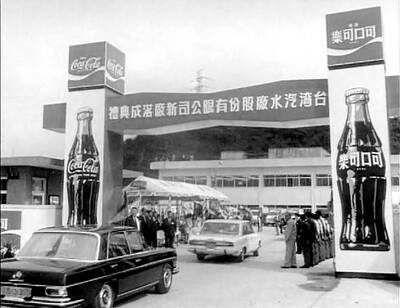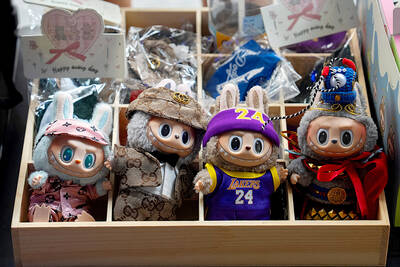Capital Ballet Taipei (台北首督芭蕾舞團) is one of those companies that can float under the radar for years, known mostly to a loyal fan base. Which is too bad because it has been around for 19 years, working hard to pursue a vision of ballet with a Taiwanese flavor in a country that has become a center for modern dance.
However, the company, founded by Hsu Chin-feng (徐進豐) and his wife Lee Shu-hui (李淑惠), has a higher profile this year, having won top prize in the performance arts category in the 7th Taishin Arts Award (第七屆台新藝術獎) last month for one of last year’s works, Surround (井), an exploration of spatial and temporal relationships.
The company’s output frequently focuses on the larger world outside the ballet studio, though still centering on Taiwan. For example, in January last year they performed Media Tycoon (媒體大亨), in which the protagonist gave up his family, friends and soul to gain wealth and power, while 2005’s Postman (郵差) examined the cyclical nature of human history.
Tomorrow night and Sunday afternoon the company will be performing a more mixed program, Ballet Pageant III (玩芭蕾3), a compilation of short ballets by four choreographers who have drawn on a diverse range of music and sources for their works.
The program begins with Life, To Be Continued (生命•未完待續), by dancer/choreographer Chiang Chiou-o (蔣秋娥), inspired by Franz Schubert’s plaintive string quartet Death and the Maiden (Der Tod und das Madchen) and his own travels in Europe. Jiang danced in Germany and elsewhere in Europe for several years, and was in When Ballet Meets Tchaikovsky by Taipei Chamber Ballet (台北室內芭蕾) two years ago.
Next up will be Hsu Chin-feng’s Salome (莎樂美), inspired by Oscar Wilde’s play about the Biblical heroine and set to music from Richard Strauss’ one-act opera of the same name. If the photos are anything to go by, this piece will be dramatic, with the dancer portraying Salome dancing a pas
de deux with John the Baptist’s head on
a platter.
The third ballet will be At the Other End, Unexpected Encounter (在另一端遇見), choreographed by Lin Wei-hua (林惟華). This work, like Marcel Proust’s Remembrance of Things Past, is a reflection of time spent with friends in years gone by, set to an eclectic mix of music by Yo-yo Ma (馬友友), Ennio Morricne and Lionel Richie.
The final work is Chicago Swans (芝加哥天鵝) by choreographer Liu Qiya (劉啟亞), which the company describes as an “elegant and wild work.”

July 28 to Aug. 3 Former president Chiang Kai-shek (蔣介石) reportedly maintained a simple diet and preferred to drink warm water — but one indulgence he enjoyed was a banned drink: Coca-Cola. Although a Coca-Cola plant was built in Taiwan in 1957, It was only allowed to sell to the US military and other American agencies. However, Chiang’s aides recall procuring the soft drink at US military exchange stores, and there’s also records of the Presidential Office ordering in bulk from Hong Kong. By the 1960s, it wasn’t difficult for those with means or connections to obtain Coca-Cola from the

No one saw it coming. Everyone — including the Chinese Nationalist Party (KMT) — expected at least some of the recall campaigns against 24 of its lawmakers and Hsinchu Mayor Ann Kao (高虹安) to succeed. Underground gamblers reportedly expected between five and eight lawmakers to lose their jobs. All of this analysis made sense, but contained a fatal flaw. The record of the recall campaigns, the collapse of the KMT-led recalls, and polling data all pointed to enthusiastic high turnout in support of the recall campaigns, and that those against the recalls were unenthusiastic and far less likely to vote. That

A couple of weeks ago the parties aligned with the People’s Republic of China (PRC), the Chinese Nationalist Party (KMT) and the Taiwan People’s Party (TPP), voted in the legislature to eliminate the subsidy that enables Taiwan Power Co (Taipower) to keep up with its burgeoning debt, and instead pay for universal cash handouts worth NT$10,000. The subsidy would have been NT$100 billion, while the cash handout had a budget of NT$235 billion. The bill mandates that the cash payments must be completed by Oct. 31 of this year. The changes were part of the overall NT$545 billion budget approved

Trolleys piled high with decapitated silicon monster heads, tattooed dealers lurking in alleyways, bin bags of contraband hidden behind shop counters: welcome to the world of Lafufus. Fake Labubus (拉布布), also known as Lafufus, are flooding the hidden market. As demand for the collectable furry keyrings soars, entrepreneurs in the southern trading hub of Shenzhen are wasting no time sourcing imitation versions to sell to eager Labubu hunters. But the Chinese authorities, keen to protect a rare soft-power success story, are cracking down on the counterfeits. “Labubus have become very sensitive,” says one unofficial vendor, in her small, unmarked, fake designer goods